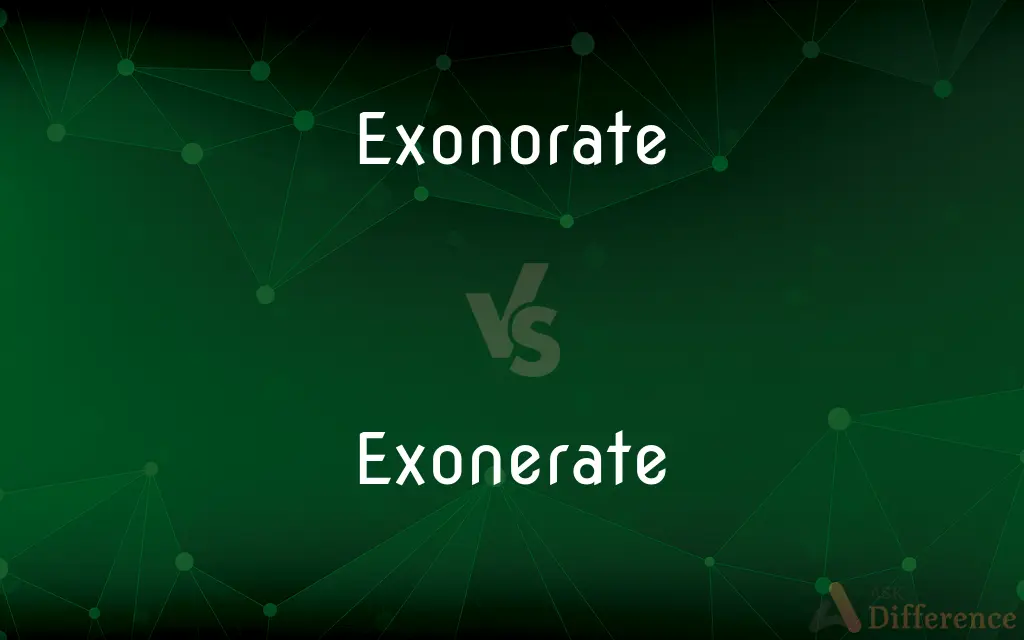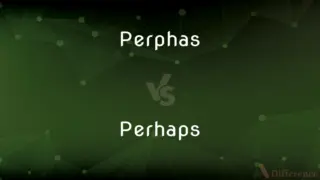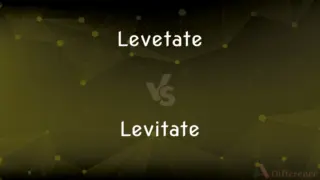Exonorate vs. Exonerate — Which is Correct Spelling?
By Tayyaba Rehman — Updated on April 3, 2024
"Exonorate" is a common misspelling. The correct term is "Exonerate," meaning to absolve someone of blame or responsibility.

Table of Contents
Which is correct: Exonorate or Exonerate
How to spell Exonerate?

Exonorate
Incorrect Spelling

Exonerate
Correct Spelling
ADVERTISEMENT
Key Differences
The right spelling, "Exonerate," contains an 'e' after the 'x' and not an 'o.'
The prefix "Ex-" as in "Exit" can help you remember it's "Ex-onerate."
Think of the word "onerous" which means burdensome; "Exonerate" means to free from a burden.
Remove the unnecessary 'o' after 'x' in "Exonorate."
Remember the phrase "Exit the blame" to recall "Exonerate."
ADVERTISEMENT
How Do You Spell Exonerate Correctly?
Incorrect: Exonorate him of all charges.
Correct: Exonerate him of all charges.
Incorrect: The evidence will exonorate the suspect.
Correct: The evidence will exonerate the suspect.
Incorrect: They tried to exonorate themselves with an alibi.
Correct: They tried to exonerate themselves with an alibi.
Incorrect: The judge decided to exonorate the defendant.
Correct: The judge decided to exonerate the defendant
Exonerate Definitions
To clear from a charge or accusation.
The evidence will exonerate him.
To declare or prove blameless.
The new facts helped exonerate her.
To absolve from any wrongdoing.
The jury voted to exonerate the defendant.
To free from blame, responsibility, or a task.
He was exonerated from the allegation.
To relieve from a duty or obligation.
She was exonerated from her duties.
(of an official body) absolve (someone) from blame for a fault or wrongdoing
They should exonerate these men from this crime
An inquiry exonerated those involved
Release someone from (a duty or obligation)
Pope Clement V exonerated the king from his oath to the barons
To free from blame.
To free from a responsibility, obligation, or task.
To relieve (someone or something) of a load; to unburden (a load).
Of a body of water: to discharge or empty (itself).
(transitive) To free (someone) from an obligation, responsibility or task.
(transitive) To free (someone) from accusation or blame.
(archaic) Freed from an obligation; freed from accusation or blame; acquitted, exonerated.
To unload; to disburden; to discharge.
All exonerate themselves into one common duct.
To relieve, in a moral sense, as of a charge, obligation, or load of blame resting on one; to clear of something that lies upon oppresses one, as an accusation or imputation; as, to exonerate one's self from blame, or from the charge of avarice.
To discharge from duty or obligation, as a bail.
Pronounce not guilty of criminal charges;
The suspect was cleared of the murder charges
Exonerate Meaning in a Sentence
The jury's decision to exonerate her brought relief to everyone involved.
His goal was to exonerate his friend, who he believed was innocent.
The investigation aimed to exonerate those who were falsely accused.
With the witness's testimony, they were able to exonerate the teenager.
Common Curiosities
Why is it called Exonerate?
Derived from Latin "exoneratus," past participle of "exonerare" meaning "to unburden."
What is the pronunciation of Exonerate?
/ɪgˈzɒnəˌreɪt/.
What is the singular form of Exonerate?
"Exonerate" is already in singular form.
What is the verb form of Exonerate?
"Exonerate" itself is a verb.
What is the root word of Exonerate?
"Onus" (Latin for "burden").
Which preposition is used with Exonerate?
"From" is commonly used.
Which vowel is used before Exonerate?
The vowel 'e' is used before "Exonerate."
Which conjunction is used with Exonerate?
Any conjunction can be used based on sentence structure.
What is the plural form of Exonerate?
The term doesn't have a standard plural form, but "exonerations" refers to multiple instances.
Is Exonerate a negative or positive word?
Generally positive, as it implies freeing someone from blame.
Is Exonerate a vowel or consonant?
"Exonerate" begins with a vowel.
Is Exonerate a countable noun?
Not in its verb form, but "exonerations" as a noun can be counted.
Is the word Exonerate a Gerund?
"Exonerating" is the gerund form.
What is a stressed syllable in Exonerate?
The third syllable, "er," is stressed.
What is the first form of Exonerate?
Exonerate.
How many syllables are in Exonerate?
Four.
What is another term for Exonerate?
Absolve.
Which determiner is used with Exonerate?
"The" or "this" can be used, depending on context.
Which article is used with Exonerate?
"The" can be used with its noun form, while either "a" or "the" might be used with its adjective form.
Is Exonerate an abstract noun?
No.
Is the word “Exonerate” a Direct object or an Indirect object?
It's typically used as a verb, not an object.
Is Exonerate an adverb?
No.
Is Exonerate a collective noun?
No.
Is the word Exonerate imperative?
It can be used in the imperative form, e.g., "Exonerate him now!"
How do we divide Exonerate into syllables?
Ex-on-er-ate.
What part of speech is Exonerate?
Verb.
What is the opposite of Exonerate?
Incriminate or condemn.
Is Exonerate a noun or adjective?
It's primarily a verb, but "exonerate" can also be used as an adjective.
Is the Exonerate term a metaphor?
No, but it can be used metaphorically.
Share Your Discovery

Previous Comparison
Perphas vs. Perhaps
Next Comparison
Levetate vs. LevitateAuthor Spotlight
Written by
Tayyaba RehmanTayyaba Rehman is a distinguished writer, currently serving as a primary contributor to askdifference.com. As a researcher in semantics and etymology, Tayyaba's passion for the complexity of languages and their distinctions has found a perfect home on the platform. Tayyaba delves into the intricacies of language, distinguishing between commonly confused words and phrases, thereby providing clarity for readers worldwide.














































